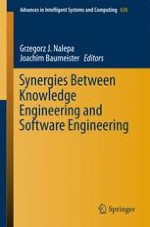2018 | OriginalPaper | Buchkapitel
Knowledge Engineering of System Refinement What We Learnt from Software Engineering
verfasst von : Rainer Knauf
Erschienen in: Synergies Between Knowledge Engineering and Software Engineering
Aktivieren Sie unsere intelligente Suche, um passende Fachinhalte oder Patente zu finden.
Wählen Sie Textabschnitte aus um mit Künstlicher Intelligenz passenden Patente zu finden. powered by
Markieren Sie Textabschnitte, um KI-gestützt weitere passende Inhalte zu finden. powered by
